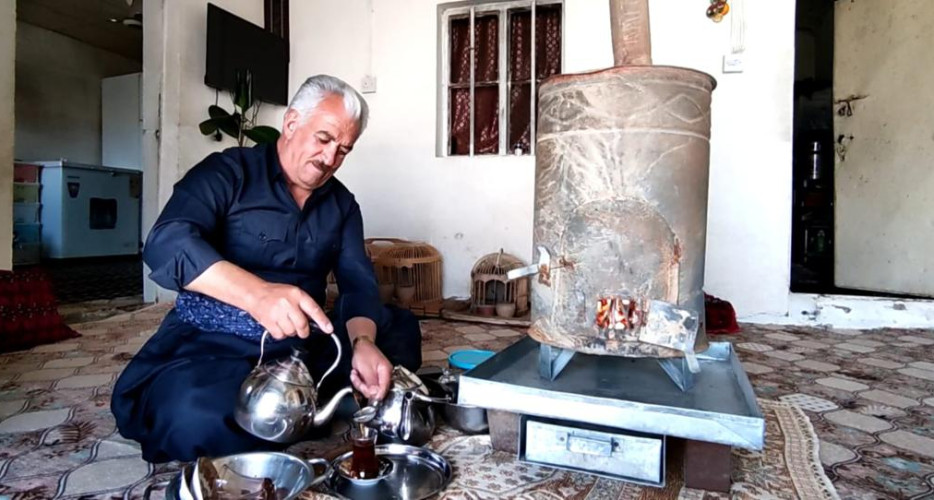
Peregraf- Hardi Osman
Half a meter of snow falls each year in Mokaba village in northern Sulaimaniyah governorate where Abdullah Qadir lives with his family. He has lived in the village in Sherbazer district for more than 25 years, but is increasingly anxious about how he is going to keep his family warm.
The Kurdistan Regional Government (KGR) has provided subsidized kerosene just once in the last three years.
"[It] has not been enough to provide our needs completely. A barrel of kerosene or something little more than that does not fill the needs of rural people," Qadir told Peregraf.
Like the other eighteen families in the village, he now plans to rely on wood-fueled stoves to get through the frigid winter.
Unable to afford kerosene on the open market, he feels forced to cut down trees for fuel, though he is careful to select ones that are not still growing. Nevertheless, he resents being put in such a position.
"We are obliged to use them, destroying the environment and its beautiful nature and cutting down the trees," Qadir lamented.
Because of the high price of kerosene, which has been the heating fuel of choice of the past two decades, the Kurdistan Region is in danger of returning to the precarious situation of the 1990s, when many forests were felled for fuel.
The KRG has provided kerosene at a subsidized rate of 100,000 Iraqi dinars ($68) for a 200-liter barrel, but distribution is spotty and prioritizes the coldest areas.
Many people, particularly in the cities, are unable to access the subsidized fuel and must turn to the open market, paying more than double for the same amount of kerosene. Prices currently stand at 250,000 Iraqi dinars ($172) per barrel, but could go up depending on demand and the price of oil.
Each family uses between two and three barrels of kerosene per winter on average, according to data obtained by Peregraf.
Unable to afford the oil-based fuel, even urban dwellers are turning to wood stoves to heat their homes.
Hazhar Mahmood, who has been building wood stoves in Sulaimaniyah for more than 25 years, said there is great demand for his products at the moment.
"In the past, [the stoves] were for houses outside the city, in country houses and villages. Even for a while, the villages did not use them and turned to kerosene, but now they are all using wood stoves," Mahmood said.
"Many people come and say ‘I will use it in the city,’" he added.
Another alternative to kerosene is LPG heating systems, but they have recently come under scrutiny following tragic incidents in Sulaimaniyah and Duhok last month, where gas tanks exploded and killed more than 20 people and injured another 50 in separate incidents.
"In the 1990s, people had to use wood stoves. For a while we didn't make them because the rate of use became so low," said Mahmood. "But now people are using them as before."
Villagers say that there are three kinds of logging for fuel in the Kurdistan Region. Some people only take dead trees, which has only a small impact on the environment and is officially sanctioned under certain circumstances, but others engage in more harmful practices by felling living trees for either firewood or charcoal production.
Depending on the type of wood, a pick-up truck’s load of firewood can sell for between 140,000 and 250,000 Iraqi dinars ($96 and $172).
"Due to the lack of enough oil and fuel for the villages, this year we have issued a new decision for villagers about who can cut down and use branches, wood, trees, and dead trees under our guidance and supervision," Brigadier General Hemn Kamarkhan, director of the Sulaimaniyah Forest and Environment Police, told Peregraf.
"Trading in wood and charcoal is severely punishable and violators will face the law," Kamarkhan stressed.
If found to have cut trees illegally, violators can be sentenced to up to a year in jail and a fine of up to 5 million Iraqi dinars ($3,437), according to the Kurdistan Region's Forest Law No. 10 of 2012. Under the law, those found guilty of cutting old or rare trees can get six months in jail and a fine of 5 million Iraqi dinars.
There are exceptions in the law for people who cut down dead trees with official permission and for landowners to engage in limited logging on their property.
Over the past ten months, 115 people have been arrested for offenses related to cutting down trees for fuel in Sulaimaniyah governorate, according to the Sulaimaniyah Forest and Environment Police.
Of those, 39 were charged with illegally making charcoal, which carries a jail sentence of between three months and a year, plus a fine of 4 million Iraqi dinars ($2,472). The other 76 were charged with illegal logging.
Last year, 158 people were arrested on the same charges.
"There are opportunistic people everywhere who cut down trees to fill their pockets," said Kamarkhan, adding that the authorities are aided in identifying suspects by villagers who want to protect trees in their areas.
"But there are few people who clear-cut their land in order to sell it or to make the trees into charcoal," he said.
While there is no clear picture of how much of the Kurdistan Region is forested, activists from the Kurdistan Green Party have said that 18.65 percent of the land within the city of Sulaimaniyah is greenspace, compared with 10 percent outside the city.
According to a 2015 survey by the KRG Ministry of Agriculture, the Kurdistan Region had 12 percent greenspace, below the world standard rate of 30 percent.